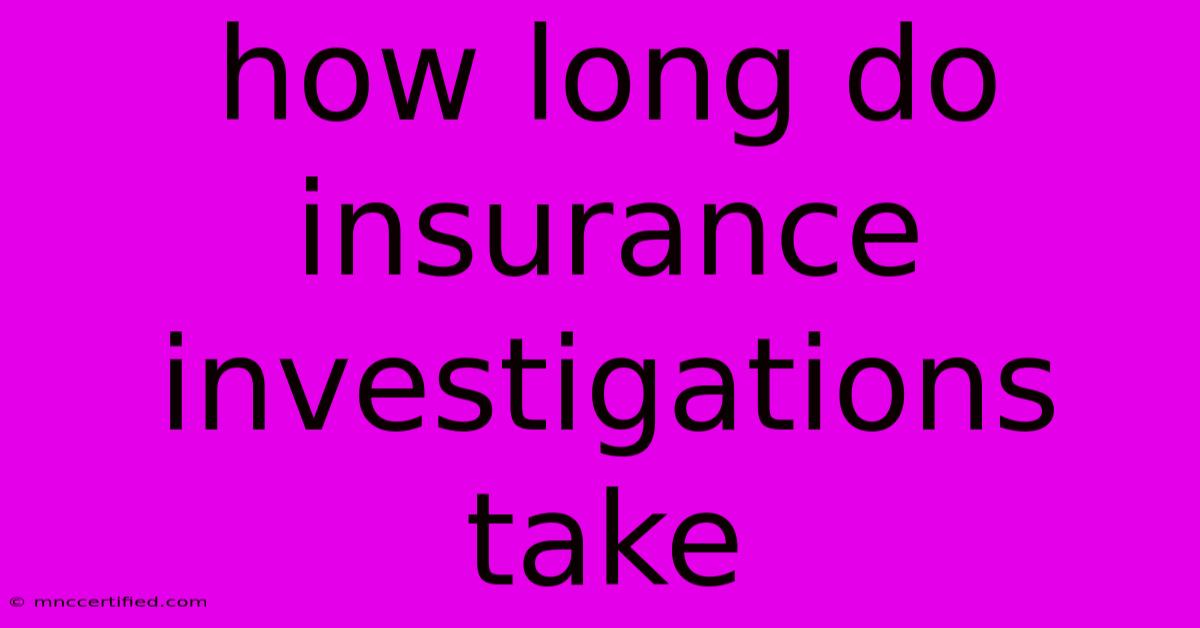How Long Do Insurance Investigations Take

Table of Contents
How Long Do Insurance Investigations Take? A Comprehensive Guide
Insurance investigations are a crucial part of the claims process, ensuring fair and accurate payouts. But how long do these investigations take? The answer depends on several factors, making it difficult to give a definitive timeframe. This article will delve into the intricacies of insurance investigations, outlining the key factors that influence their duration and providing insights into what you can expect as a policyholder.
Factors Affecting the Length of an Insurance Investigation
1. Complexity of the Claim: The nature and complexity of your claim significantly impact the investigation's duration. Simple claims, like a minor car accident with clear evidence, often get resolved faster than complex ones involving multiple parties, extensive damage, or legal disputes.
2. Type of Insurance: The type of insurance coverage involved also affects investigation timelines. Auto insurance claims generally involve quicker investigations compared to life insurance or disability claims, which require more extensive medical documentation and financial analysis.
3. Cooperation from the Policyholder: Your cooperation during the investigation plays a crucial role in determining its length. Providing accurate information, documentation, and timely responses to requests will expedite the process. Conversely, delays caused by missing information or uncooperative behavior can prolong the investigation.
4. Involvement of Third Parties: Involving third parties, such as independent adjusters, lawyers, or medical professionals, can add time to the investigation process. Each party needs to conduct their assessments, communicate findings, and coordinate with the insurer, contributing to the overall duration.
5. Availability of Evidence: The availability of evidence, such as accident reports, medical records, or witness statements, is critical for the investigation. Insufficient evidence can delay the process as investigators need to gather additional information, which takes time.
6. Insurance Company's Internal Processes: Each insurance company has its internal processes and policies for handling claims. Their efficiency and resources influence how quickly they can conduct investigations and reach a decision.
7. Legal Challenges: If a claim involves legal disputes or litigation, the investigation process will likely take longer. Legal proceedings can significantly delay the investigation as both parties need to gather evidence, engage in discovery, and potentially go through court proceedings.
Typical Timeframes for Insurance Investigations
While providing exact timeframes is challenging, here's a general idea of how long different types of insurance investigations can take:
-
Auto Insurance: Simple claims with minor damage and clear liability can be resolved within a few weeks. Complex claims involving extensive damage, multiple parties, or legal disputes may take several months or even longer.
-
Homeowners Insurance: Similar to auto insurance, simple claims with minimal damage and straightforward circumstances can be resolved within a few weeks. More complex claims involving major structural damage, fire, or theft can take several months or even longer.
-
Life Insurance: Life insurance claims often require extensive documentation, including death certificates, medical records, and financial records. Investigations can take several weeks to months depending on the complexity of the case and the availability of required information.
-
Disability Insurance: Disability insurance claims involve evaluating medical conditions and determining if the claimant meets the policy's definition of disability. The investigation process can take several weeks to months, depending on the nature of the disability and the required medical documentation.
What You Can Do to Speed Up the Investigation
- Respond Promptly: Respond to the insurance company's requests for information and documentation promptly.
- Provide Accurate Information: Ensure that all information provided is accurate and complete.
- Be Cooperative: Collaborate with the insurance company and any other involved parties throughout the investigation.
- Keep Records: Maintain records of all communications, documentation, and events related to the claim.
Conclusion
Insurance investigations can take anywhere from a few weeks to several months, depending on the complexity of the claim, the type of insurance involved, and other factors. Being prepared, providing accurate information, and cooperating with the insurance company can help expedite the process. Remember, patience is key, but don't hesitate to follow up with the insurance company if you feel the investigation is taking an unreasonable amount of time.

Thank you for visiting our website wich cover about How Long Do Insurance Investigations Take. We hope the information provided has been useful to you. Feel free to contact us if you have any questions or need further assistance. See you next time and dont miss to bookmark.
Featured Posts
-
Insurance Requirements For Owner Operators
Nov 07, 2024
-
Bayern Win Over Benfica Musiala Reacts
Nov 07, 2024
-
Utsa Confirms Student Death At Parking Garage
Nov 07, 2024
-
Green Satoshi Token Price Prediction 2040
Nov 07, 2024
-
If Your Bond Is 1000 How Much Do You Pay
Nov 07, 2024